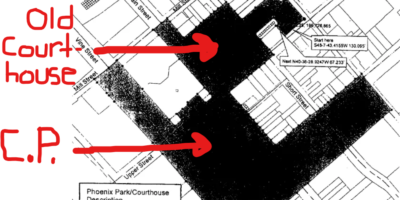Park markets at city hall
By Danny Mayer
On December 17 in front of a local government building in the rural Tunisian town of Sidi Bouzid, Mohammed Bouazizi set himself on fire and ignited an uprising in the Mideast with reverberations felt as far away as Madison, Wisconsin. Bouazizi, a twenty-seven year old college graduate, sold produce as a street vendor to support his family. On the day in question, police confiscated Bouazizi’s vegetables, which he had procured on $200 credit, because the Tunisian lacked (or didn’t) a proper permit to sell food.
Bouazizi set himself on fire after the governor refused to hear his grievances. The Nation‘s Laila Lalami described the immolation as “an act of desperation that inspired the country’s thousands of unemployed [college] graduates to take to the streets in protest.” The rest is still living history: Egypt, Bahrain, Iraq, maybe Saudi Arabia. The list goes on.
Clearly a number of factors have played into the Tunisian and subsequent uprisings in the Mideast, but the entwined problems of unemployment, food security and unresponsive government have played a central role in several. The global food crises of 2008 saw rice, wheat, corn and soy prices skyrocket, in some cases doubling in price over a two year period. Sudden inflation led to food riots in (among other places) several North African countries, Egypt among them. Bouazizi’s death by fire resonated in large measure with citizens because he was an indentured seller of produce. Indeed, many of the first concessions imperiled Mideast rulers have made is to increase food subsidies for the people—to increase public access to food. One might argue that the recent Tunisian and Egyptian sparks for change were a continued reverberation of the food riots of 2008.
In the last year, as corporate capitalism has roared back, the world has seen a near return to 2008 food crisis levels, with everyone from The Wall Street Journal and Alltech to Democracy Now acknowledging that this year should be worse than last.
Though Kentuckians spend significantly less of their income on food than nearly anywhere else on Earth, the inflationary creep of higher food prices has begun to set in. On Friday, January 28, the Herald-Leader business section reported that Cincinnati-based Proctor and Gamble, which “counts Pampers diapers, Gillette shavers and Crest toothpaste among its major brands,” announced the likelihood of price increases to combat a number of fast-rising costs brought on by the increase in oil.
A January 3 H-L article reported a 2.5% increase in retail food prices between September and December, with fruits and vegetables experiencing the greatest price jump. Another article, titled “Americans face price increases on most consumer goods,” notes that “[p]rices for corn, sugar, wheat, beef, pork and coffee are soaring” again this year.
Oil, if you aren’t aware by now, greases just about every economic transaction of significance throughout most of the known world. Imagine how many oiled up transactions—mining of raw materials, transport, refining, transport, assembling, transport, distributing, transport, selling—it takes to buy a disposable razor. Now think of it in terms of agriculture: oil for pesticides, oil for the tractor, oil to bring to refineries or shipment stations, oil for packaging, oil for cooling in the store.
Complex businesses like Proctor and Gamble or Kroger, who I assume have many economic relationships with factories and markets located throughout the globe, require a lot of cheap grease. When oil goes up–and whether you attribute it to higher global demand, speculation or peak oil, it’s going up– things start to add up.
Big picture: food is going to be a more overtly political issue in Kentucky (as in the rest of the country), as out-of-employment 99ers and debt-stricken college graduates, among others, are forced to pay more for basic staples on less and less money.
***
In the last issue, I wrote a 1500 word piece calling on the city to “allow, encourage, and if necessary organize small weekly farmer’s markets” at five city parks located throughout Lexington (“Maximizing our park yields,” February 16). The article offered a brief economic rational for the park markets, and it suggested ideas for how such markets could be nurtured and grown through a more diverse use of city park land. It also provided a list of city council members who might have mutual or overlapping interests: parks and rec folk, locavores, River Hill Park supporters.
But at its heart, I wrote a 1500 word article on why it would be a good idea for the city to actively support five small weekly farmer’s markets on city park grounds. Except for George Meyers (incorrect email), I sent the article to each council person with the following message:
Dear Council:
This was written and circulated to the community. We need better distribution of markets throughout the city. I intend to continue advocating publicly for this, particularly as the city starts discussing expensive plans for Rupp Arena. Feel free to continue to update me with specific plans for how you plan to address the community’s food needs.
Sincerely,
Danny Mayer
Lexington citizen
Editor, North of Center
Of the thirteen council people receiving the article and email, only one (1) responded back, to inform me that while not a single person on council was looking at food as a central dynamic informing city decisions, my thoughts would be added to the other good ideas generally circulating around in the ether. The council member also suggested that I presented difficult problems with unreasonably easy solutions, that big problems necessitated “looking for opportunities and working on related issues as they arise.”
I responded by asking the following question: “Are you suggesting that having public markets at 5 locations on public city park land is too big a problem for City council to address?” Four times I asked this question and never got a response. I’m left to assume that either park markets are too difficult for council to take on, or that council members don’t see the value in expending the energy required for putting in such parks.
With that in mind, consider the lesson of the Mideast uprisings as argument one for value: self-preservation.
We are not oppressed politically here, but the U.S. has greater inequality than Egypt; we are not close to food riots, but around 15% of the population in this region are food insecure. As Tunisia and other places show, the downtrodden citizens of oligarchies see food as a primary responsibility of government. Eventually, the hungry and poor and dis-empowered do rise up and get heard, no matter how much they are ignored.
Our city council would do well to remember that and to use food initiatives–relatively inexpensive but equally useful to all demographics–as a way to build trust and solidarity in its leadership.
Contact Danny Mayer (Mayer.Danny@gmail.com) if interested in offering specific contributions to beginning a park market. Growing season is upon us. Plans must be made.




Leave a Reply